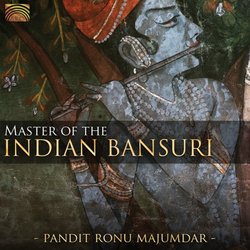| All Artists: Pandit Ronu Majumdar Title: Master of the Indian Bansuri Members Wishing: 0 Total Copies: 0 Label: Arc Music Original Release Date: 1/1/2006 Re-Release Date: 10/23/2007 Genres: International Music, Pop Styles: Reggae, India & Pakistan, India Number of Discs: 1 SwapaCD Credits: 1 UPCs: 743037205627, 5019396205628 |
Search - Pandit Ronu Majumdar :: Master of the Indian Bansuri
 | Pandit Ronu Majumdar Master of the Indian Bansuri Genres: International Music, Pop
|
Larger Image |
CD Details |
CD ReviewsMaster? Andrew W | Japan | 07/29/2009 (1 out of 5 stars) "I don't wish to appear condescending to the reader. I am assuming that anyone who has gotten this far and located this page knows a thing or two about Indian Classical Music. However, for the record I feel it worth re-stating a few basic premisses and re-defining our terms.
Hindustani Classical Music is not 'music' in the sense of the Western use. I would argue, in fact, that we need another term of reference to define such sounds. Classical Indian Music was not designed to entertain per se., rather it was born from a desire to do three things: i) To express the divine, to express the nature of Godliness and the Supreme here on earth. ii) As a form of homage and worship. iii) As a vehicle for spiritual practice and personal spiritual liberation. With those terms established and using them as a clear point of reference, it should be very easy to ascertain whether of not an Artiste or performance meets and adheres to those criteria i.e. whether or not they are performing Hindustani Classical Music, or simply 'Indian' music. On this particular CD the performer (I hesitate to use the word Artiste) has simply recorded four tracks of Indian music. This CD fails for a number of reasons, however to keep my review brief, let me illustrate four quite serious deficits: i) The choice of compositions. In respect of Hindustani Classical Music, these 'mix-and-match' CDs are really never any good because you are only hearing one portion of the raag and not the entire composition. Invariably the producers of such compilations elect not to include the slower Alap and go straight to the more climactic parts. This is a mistake and is akin to putting the last chapter of a novel in an anthology. ii) The bansuri player. Whilst I do not wish to personally attack the bansuri player Ronu Majumdar, he is not as the title suggests a 'master'. Anyone who purports to be so clearly is not, and if the record company suggested the title he should have objected. If I try and compare him to a real master, e.g. Pt. Hariprasad Chaurasia, an Artiste who has truly mastered the bansuri, and universally acknowledged so, I cannot, for there is no comparison. Ironically Pt. Hariprasad Chaurasia also released a CD with a similar title, however he chose to call it 'Maestro of the Indian Flute', that humility alone speaks volumes. One aspect of Ronu Majumdar's playing which is quite unsettling (and also indicative of someone who is NOT a master) is his very short breath span. Practitioners of the bansuri are by nature also experienced yoga practitioners and have outstanding abilities to exhale for extended periods of time. On this CD his breath is not attuned to the bansuri and instead is very choppy, in fact it sounds almost like someone playing a regular flute. iii) The tabla player. In Indian Classical music there are six recognised 'Gharanas' (styles, or schools of playing tabla). This particular player, Arvind Kumar Azad comes from the Benares Gharana. Because of this, or because of his own personal 'style', his playing is decidedly 'wooly' and rather amateurish to say the least. His method of striking the tabla is somewhat lacking, in my opinion and his playing abilities are really not up there with the other Artistes on the concert/record performance circuit. I concur that he has a long way to go before he is truly ready to take the stage - judging by this performance, at least. iv) The pairing of this bansuri player and this tabla gharana. Developing the previous point - as stated, Arvind Kumar Azad comes from the Benares Gharana lineage/school. However, whilst not exclusively so, it is not this style of playing and striking which, in my opinion, best matches with the subtlety of the bansuri. The mixing of some styles simply does not create a good dynamic and sounds rather ill-matched. One perfect match, however, is when Farukhabad Gharana practitioners Pt. Anindo Chatterjee or Ustad Sabir Khan are paired with Pt. Hariprasad Chaurasia. There you will see a perfect match of styles. In summation, I would say that if you are fan of Hindustani Classical Music, then this CD is not for you. If however, you like generic Indian music, then this CD might well satisfy you. If you are in the latter group, however, I would appeal to your higher nature and suggest you search a little harder for something which is ultimately more satisfying and rewarding. As a starting point I would wholeheartedly recommend any of the recordings Pt. Hariprasad Chaurasia made on Navras Records. Notable the full raags: Ahir Bhairav, Kaunsi Kanhra and Lalit, all of which are outstanding." |

 Track Listings (4) - Disc #1
Track Listings (4) - Disc #1